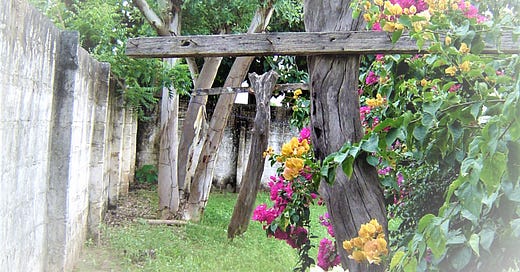“Life is short, the Art long, opportunity fleeting, experiment treacherous, judgement difficult.” - Hippocrates1
She sat in her sleeping chamber, staring at the printed patterns of rhythmic language. Echoing through the ventilation aperture across the corridor, the complicated rhythms of the labourers’ voices clashed with the simple rhythms she was memorizing. The labourers were there to clear the green earth blanket that had sprouted in the walled yard during the growing season. The blanket, lovely as it was, must be removed. It gave cover to serpents.
If a serpent appeared near a human, it must be destroyed. That was the first instruction her new companions gave on her arrival. It was too long a journey, they said, back to the metropolis for the antidote to serpent venom. She understood. She had come through the metropolis on her journey here. The uncertain passage over the wide liquid way between here and the metropolis would rob precious time from a human injected with venom. Her companions assured her that the labourers or watchmen could be summoned to kill any serpent.
She heard the clang of the outer yard entrance. She was alone. Her companions were busy elsewhere. The labourers must have finished, or perhaps they were going for the customary daytime respite, to refresh themselves with three small glasses of sweet brew from green stimulants. She got up and glanced towards the exit of her chamber. She noticed a slender cord on the tiled ground that she did not remember seeing there before.
The cord was draped over the step down into her chamber. It curved oddly upward and downward. Her heart suddenly contracted and then leapt. The cord had a small, slender head curving upward and a long tapering tail curving downward. Had it somehow entered the corridor to hide from the labourers tearing up the green cover?
She did not know if the labourers would return. If they did, she did not know the rhythms to signal her need. The portal to the corridor from the walled yard was sealed. No one could get to her. She could not leave her chamber with that live head and tail lying across the exit. She could not let it slither into another sleeping chamber. She was not the only human to rest here. If she lost it now, another might step on it in the night.
She had to kill it.
Her memory flickered back to an evening shortly before she began her long journey to this place. An old friend, a professional guardian of her nation, was saying farewell. He placed in her hands a long, flat object, muttering that it wasn’t very sharp but sometimes a dull blade did the best job, and left. She looked at the gift in the light of her dwelling. It was a handled and sheathed blade the length of her forearm.
Now she watched the chamber exit as she stepped toward her wardrobe. As she moved the head and tail turned, sliding further into the chamber along the partition toward her sleeping couch. Opening the wardrobe door, she found the blade and unsheathed it. The head and tail slid out of sight under the sleeping couch.
She drew the couch away from the partition. Remembering her unprotected feet, she climbed on top of the couch, looking down into the space between the couch and the partition. There it was. She recalled what one of her companions had said. The humans of this place say a serpent is not dead unless the head is severed. She struck downward with the blade.
The head slid forward as she struck. The blade cut the tail. The head whipped around, its jaw clamping on the long blade.
She pulled the blade back and struck downward again. This time the blade landed just behind the head, severing head from tail.
The tail writhed. The jaw of the head opened and closed. She swept the head and tail onto a waste receptacle. Then she examined the serpent.
The tail back was covered in dull, dark grey-green scales, the underbelly with lighter scales. The slender head was the shape of a coffin. The inside of the open jaw was coal black. From the top of the jaw, on either side, glimmered two thin curved tubes with strands of clear viscous fluid dangling from their ends. On her blade, there was a trace of clear viscous fluid where the jaw had closed on it with that first strike.
She moved through the rest of the chambers, checking under and in furnishings to ensure there were no more of the same kind. She heard the labourers return. Taking the receptacle, she went out into the yard and held the remains out for the labourers to see. They gestured for her to put it in their handcart. She tipped the remains into the handcart and went to find her companions.
All the information she could gather suggested the serpent had been a juvenile of the deadliest kind, having venom that activated within hours of hatching. The longest a human could survive an injection of such venom was two hours. But she had not been injected. The serpent was dead. The green yard covering had been removed. Any portals into the sleeping quarters were blocked. It probably was, as her companions told her, a once in a lifetime experience.
To be continued…
Update: Part II here.
Hippocrates. Aphorisms. W.H.S. Jones. (2019). Athens: Aiora.




